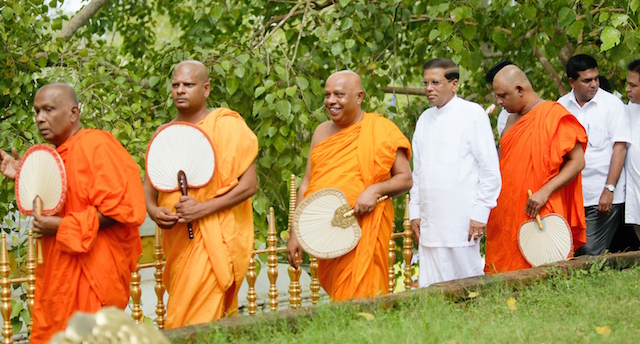Critical Evaluation & Democratisation Of Article (9)

By Mass L. Usuf –July 3, 2016
The Public Representations Committee on Constitutional Reform (PRCCR) appointed by the Cabinet of Ministers on the 22nd of December 2015, has released its Report with regard to the proposed Constitutional reform.
The more than 300-page Report goes on to state that a study of the representations made by the public reflects a desire in the people throughout Sri Lanka towards democratisation of the State, establishment of the Rule of Law, broadening Fundamental Human Rights, Peace and Reconciliation and strengthening of independent commissions.
The PRCCR recommendation inter alia regarding Article 9 was interesting to read specially, from the perspective of the desire towards democratisation. It merits a critical evaluation from the view point of the Report and the usefulness of Article 9 itself.
The recent Sri Lankan history is pregnant with the germ of political opportunism, nationalism and later Sinhala Buddhist nationalism. Each of these ‘isms’ singularly and collectively conceptualising and institutionalizing Article 6 of the 1972 Republican constitution, the precursor to the present Article 9 of the 1978 Socialist Democratic constitution. Many in the past have argued that the rise and institutionalisation of Sinhala-Buddhist nationalism in post-independent Sri Lanka bear much responsibility for today’s protracted ethnic conflict between the majority Sinhalese state and the minority Sri Lankan Tamils. [i]
Prophecy
A Federal Party member, K.P. Ratnam, criticizing the formative document [ii] that led to Article 6 and now Article 9 prophetically stated in 1972:
“I wish to tell you that this position will be a cause of continuous strife for this country” [iii]
As I write this today, even after the lapse of 44 years of this prophecy, the conflict has extended from the Tamils to the Muslims and the Christians. Some robed racists continue the pretense of having taken upon themselves what the State is supposed to do – that is to give the foremost place to Buddhism per Article 9. These fascists are pretentiously claiming to ‘protect’ Buddhism using everything that violates the Buddha dhamma viz. hate speech, manufactured lies, violence and fear mongering.

Scant academic or political discussion has taken place on the impact of Article 9 on the right to religion of the non-buddhists. The ramification of this Article on a pluralistic society like Sri Lanka is largely unexplored publicly. Sri Lanka is a signatory to several international treaties on human rights etc.

